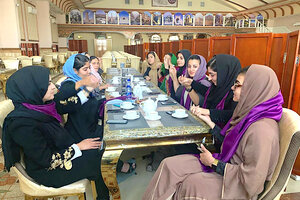Women’s role in a post-9/11 world
In the long struggle against terrorism, women need not be only victims or perpetrators. The world has learned to recruit them as positive actors against violent jihad.

Women in Kabul, Afghanistan, gather Sept. 4 to demand their rights under the Taliban rule.
AP
Soon after the 9/11 attacks in 2001, many commentators noted a particular aspect of the 19 hijackers: None were women. That simplistic view of women as anti-terrorist has lessened over the past 20 years. Hundreds of women have since conducted suicide bombings or attempted them for extremist groups. Many more have recruited young fighters, especially for the Islamic State group. Yet just as compelling since 9/11 has been another trend: More women are leading efforts to defeat terrorism, often by giving early warnings of an attack or promoting counternarratives to violent jihadi ideology within families and communities.
In Morocco, for example, Muslim women have been trained as preachers to espouse moderate interpretations of religious teachings. In Kenya, a civil society group called Sisters Without Borders trains women-led organizations in helping governments prevent terrorist attacks. In Sudan, women led protests that ousted a terrorist-promoting dictator. Female protesters in Iran have demanded that leaders stop backing foreign terrorist groups.
“Because of their distinctive access and influence, women are crucial antiterrorism messengers in schools, religious institutions, social environments, and local government,” Jamille Bigio, a former fellow at the Council on Foreign Relations and now a top USAID official, told Congress two years ago. Women are particularly sensitive to signs of radicalization, says Ms. Bigio, “because attacks on their rights and physical autonomy are often the first indication of a rise in fundamentalism.”
At the United Nations, meanwhile, the Security Council has passed resolutions encouraging nations to empower women in the prevention of violent extremism, especially as mediators and negotiators for peace. “After nearly two decades of ongoing efforts to defeat terrorism, the international community has learned that it must engage women as positive actors in their comprehensive strategies to tackle drivers of violent extremism and counter radicalization,” states a commentary by the United States Institute of Peace.
Twenty years on, one lesson from 9/11 is that women can and should be leaders for peace. The more they are empowered to save innocent lives, the more they will be recognized for saving innocent lives.

